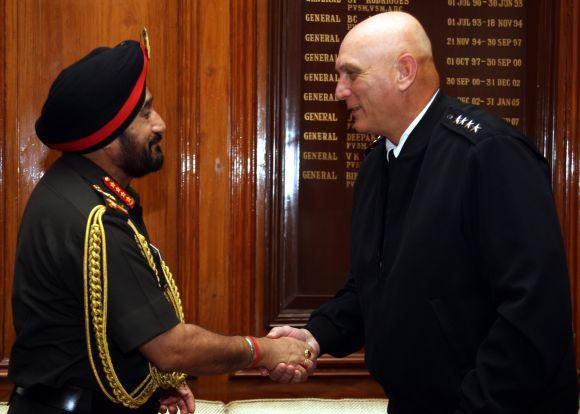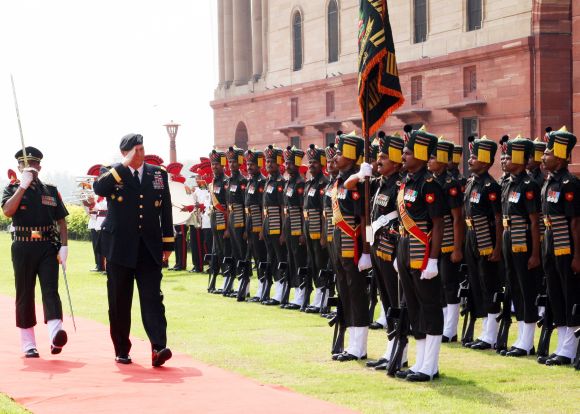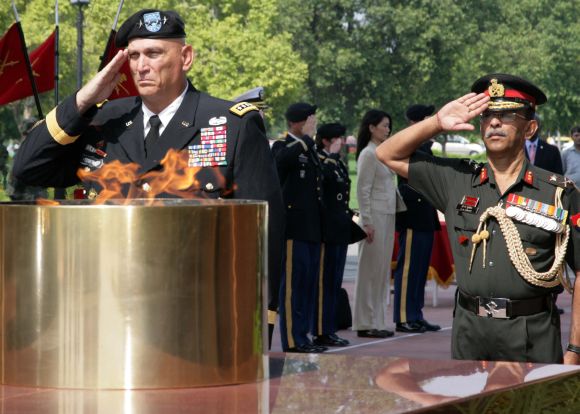Photographs: Courtesy: Indian Army Aziz Haniffa in Washington, DC
United States Chief of Army Staff General Raymond T Odierno, who recently returned from India, has denied that growing military ties and joint exercises between Washington and New Delhi were an attempt by the US to co-opt India to ‘triangulate’ or ‘contain’ China, reports Aziz Haniffa.
In an interaction at the neo-conservative American Enterprise Institute, United States Chief of Army Staff General Raymond T Odierno has asserted, “One of the things we have to remember is that they (India) maintain their own strategic autonomy”.
Essentially the US strategy in military cooperation with India was to build capacity and help learn from each other.
Speaking to an audience that comprised defence and military analysts and representatives of the military-industrial complex, Odierno argued, “Where you get into a policy of containment is when you start having large land forces forward stationed in countries -- and that’s not our plan”.
“We will continue to build partner capacity, and continue to do exercises ranging from missions of humanitarian assistance to disaster relief to other missions,” the general added.
He said it was a step in building confidence, so that the two countries could work together to resolve and continue to move forward together in the Asia-Pacific region, including China.
Please …
'Must ensure we don't build animosity between major powers in Asia Pacific'
Image: US Army Chief General Raymond Odierno inspecting a guard of honour at South Block in New DelhiPhotographs: Courtesy: Indian Army
“So ours is not to contain China, ours is to build relationships, to build better support for the United States Pacific Command and to see it tends to ensure that we don’t get into conflict, we don’t build animosity between all the major powers in Asia-Pacific,” he added.
Pressed to disclose some of his discussions with his Indian military counterparts, General Odierno said, “As you look to Asia-Pacific, it’s about competition for limited resources, it’s about making sure that everyone is able to sustain their sovereignty and meet their own interests”.
He added that the ‘discussions we had were really about where we can help each other and look ahead on how we try to ensure that some of these issues don’t get blown out to something much bigger than needs to be’.
Odierno said ‘those are the kinds of discussions that are important as we have mil-to-mil discussions,’ and declared that a military relationship with India was imperative, ‘especially in times of crises.’
Please …
'We realised how much we have in common'
Image: US Army Chief General Raymond Odierno saluting at the Amar Jawan Jyoti in New DelhiPhotographs: Courtesy: Indian Army
He noted that ‘the large majority of Indian (military) leaders were educated here in the United States -- whether it was at the Army War College or the National Defecse University, Air War College. So that helps us understand each other as we go forward. So, for me that’s the kind of thing we have to do as we tackle some of the tough problems’.
Odierno said this was his second trip to India since five years ago when he served as a military advisor to then US Secretary of State Condoleezza Rice. “They were very different times then -- the end of 2005 beginning of 2006”.
He emphasised that ‘for me it was a very important visit and it was my first visit with my military counterpart, General (Bikram) Singh, and I had an opportunity to talk to him about a variety of issues, but one thing we realised was how much we have in common -- the two largest democracies in the world, two very professional armies, and there are things we can do to learn from each other’.
Odierno said he had also visited the Indian Army’s Northern Command, ‘which is the most important command, which is responsible for the borders of Pakistan and China.’
He said in his interactions with the staff and commanders, what really struck him was that ‘what they’ve been doing for the last 20 years, is what we’ve been doing for the last 12 years -- counter-insurgency.’




article